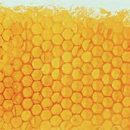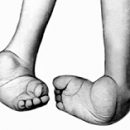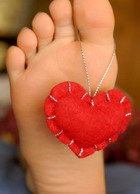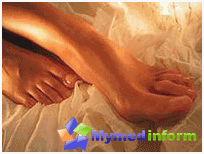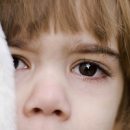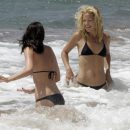What is closure? What are the symptoms of closure? How to treat closures? Answers to these questions you will find in the article.
Content
Clubfoot
Convolution - deformation of the foot characterized by its deviation
inside from the longitudinal axis of the leg. Distinguish congenital and acquired
clubfoot.
Congenital tilence can be one of the signs as systemic
Diseases and skeletal dysplasia - arthrogriposis, dysotosis,
Osteochondroflasis and other., and malformations, such as longitudinal
Ecroidomelia. It happens one- and bilateral. Congenital closure as
Independent disease refers to frequently encountered
deformations. It is usually detected at birth and later
Progres. Congenital footage of foot joints is found,
manifested with solebed flexion in the ankle
(equinoma), omitting the outer edge of the foot (supination) and bringing
her front department (adduction). With sharply pronounced stop
turned inside, the outdoor edge is turned down the book and the stop, and the inner
Went edge - up. The back surface of the foot is facing forward and
Down, and the sole - back and up. Supination of the foot is so
significant that the heel can touch the inner surface of the leg.
In addition to these symptoms, in congenital closures are often observed
twisting of the bones of the leg of the duck (torsion), transverse slope of the sole
(inflection), which is accompanied by the formation of the inner edge
The middle department of the foot of the transverse groove (adams furrows) and the varestic
deformation of the fingers of the foot.
Depending on the fixedness of the contractures of the foot joints allocate
Easy degree of closure (movements in the ankle stored,
And the deformation can be passively fixed); Middle-weight closure
(movements are limited, and partial correction is possible); Heavy
closure (passive correction is impossible). Regardless of degree
deformation violated form and function not only feet, but also the entire bottom
limb. There is a delay in the ossification of the bones of the foot.
How to treat closures
Treatment of congenital closures is carried out by orthopedist in outpatient
conditions. In some cases, with severe deformations, children
hospitalized in orthopedic hospitals or sanatoriums.
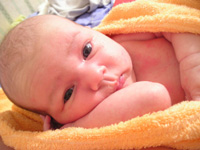
The main in the elimination of congenital closures is the complex
conservative events, including correction of deformation and
Holding the reached correction. The success of conservative treatment depends
both by the severity of deformation and the timeliness,
The correctness and rational stratification of therapeutic measures.
The most effective method of early functional flow,
which includes a directional (active passive) impact on
Certain muscle groups for deformation correction in plaster
dressing; The use of pipes from polymeric materials fixing
lower limbs and allowing to include medical
activities physiotherapy, medicinal gymnastics, massage and physical
Exercises in water. Treatment starts from the first days of the child's life.
Redressing produce carefully. Stop fixed in position
reached correction using stage gypsum bandages with special
Wedge-shaped gasket. To prevent the recurrence of deformation
Appoint orthopedic shoes, medicinal gymnastics and massage. First
a year after the end of the child's treatment examines every 2-3 months., then
no less often 1 times a year before the end of the growth (until 18-21).
With the ineffectiveness of conservative treatment of congenital closures
or its late diagnosis is carried out operational interventions on
Tender-ligament apparatus (early childhood). In more
Older Age is needed interventions on bones and foot joints.
To eliminate innate closures, successfully apply
Distraction and compression devices (Volkov - Oganesyan, Ilizarova).
With timely treatment, the forecast for the function of the lower limb
Usually favorable.

